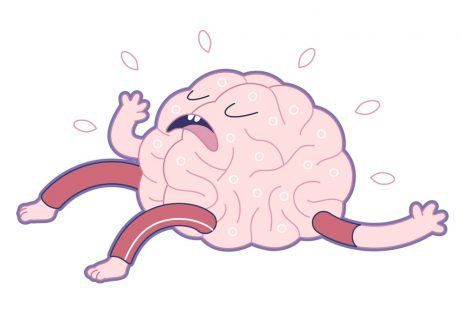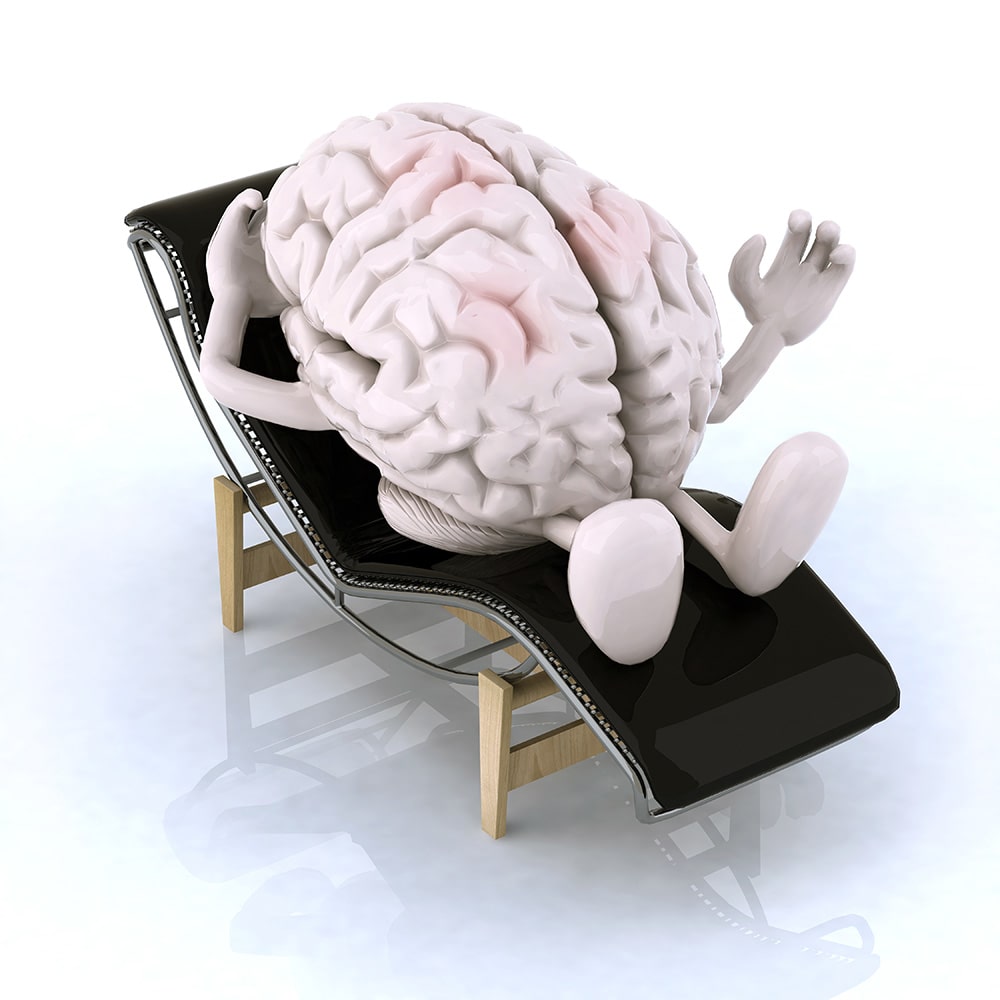Understanding the connection between anxiety and mental exhaustion

What is mental Exhaustion?
Mental exhaustion, also known as brain fog occurs when a person indulges in too much mental activity, never giving their brains a chance to rest and recuperate. This mental burnout can be the result of overthinking, continuous stress, worry, constant self-concern or introspection.
As all of the above are typical behaviours of the anxiety sufferer, then it comes as no surprise that so many who suffer from anxiety experience the symptoms of mental fatigue.
Symptoms of mental exhaustion
- Foggy head, the feeling of detachment from the outside and others
- Feeling mentally and physically worn out; complete lack of energy
- Feeling the need for solitude and social isolation
- Finding conversations and social situations difficult
- Finding it hard to concentrate on a task, lack of general concentration
- Constantly forgetting things
- Physical fatigue
- Recurring psychological pain or headaches
- Often irritable, especially around others
- Thinking is slow and laboured
- Lack of emotion
- Headaches or a tight feeling around the head
- Constantly sad or depressed
- Feeling self-aware, as though you can’t think of anything but yourself
- Repetitive and obsessive thoughts
- Mind going blank/freezing when in conversation
- Loss of confidence
- Feeling like your head is full of junk
- Poor mental health
- Blurred, out of focus vision
- Trouble sleeping, waking up early or regularly through the night
- Unable to think straight, confused and muddled thinking
- Finding you lose track when trying to read or watch a movie
- Lack of clarity
- Complete lack of motivation
- Lack of enthusiasm and enjoyment in life
Someone dealing with mental exhaustion can find themselves feeling overwhelmed by everyday tasks and may feel a real longing to walk away from all their responsibilities. They may have a desire for others to leave them alone, due to them having very little mental energy for anything or anyone outside of themselves. They can find it hard to deal with the smallest amount of stress and feel constantly irritable like they are about to break.
Mental exhaustion can also lead to someone feeling physically and emotionally exhausted as both are connected to the brain. This is why someone suffering from mental tiredness may feel emotionally flat or have little energy in their muscles, finding any sort of physical activity a real strain.
They may also find it hard to concentrate, have little mental clarity and on occasions feel a sense of detachment from their surroundings. Even a simple task like reading a book, following a conversation or watching a TV program can be difficult.
They may keep forgetting what they are doing halfway through a task or keep making mistakes at work. They may also be constantly irritable and snapping at those around them. They can feel a real need for silence and solitude and if they can’t get it, they may lash out.
If the above describes you in any way, then it is pretty likely that you are suffering an exhaustion of the brain. One that you have pushed way beyond what it was designed for.
As stated, mental exhaustion is created by overworking the brain, mainly through stressful/worrisome thinking. Your brain is a physical organ, and like any other organ, it needs periods of rest to recuperate. When it is overworked and doesn’t get the break it needs, then it will start showing signs of fatigue.
This fatigue is your brain’s way of sending you a message through the form of suffering. It is telling you that it cannot cope with this constant over-thinking, worrying, or self-concern and that it needs a break from this continuous mental activity so that it can begin to heal.
Why do anxiety sufferers feel so mentally worn out?

The mental exhaustion that anxiety sufferers experience is mainly due to the over-thinking of their condition. This is caused by continually trying to find a solution to how they feel through using their thinking process.
They may spend a lot of their time reading about their condition, be it through books, on forums, chatting with other sufferers, or spending a lot of their time searching on the internet for solutions. Trying to find answers and relief can become a full-time job for many.
Another common reason for mental fatigue is due to sufferers trying to keep up a pretence to the outside world and those around them that everything is fine. Attempting to keep up this act can be extremely challenging and exhausting.
Add that to all the worry about how anxiety is affecting their life and their attachment to all the worrying thoughts that anxiety brings, and so it becomes pretty clear why they find themselves so mentally burnt out.
My own experience with mental fatigue

Mental exhaustion was something I also suffered with and for pretty much all the reasons above. This exhaustion is why I found it hard to be around people; I just didn’t have the mental energy or clarity to hold a conversation.
I initially thought that this was a sign that I didn’t feel comfortable around people when this was not strictly the case. It had more to do with the fact that I didn’t have the mental energy to socialise or talk freely with others.
It is also why I craved solitude. I thought that I was anti-social or that I was losing the will to enjoy life, but it was just my mind needing a break. It was crying out for a rest by saying, “I can’t do anything today, I haven’t the energy and need some rest”. This is also why I found it hard to read or watch TV. My brain didn’t have the clarity or space to take anything in and just wanted to do the bare minimum.
I never saw the signs of exhaustion initially but, when I did, how I felt started to make complete sense. It also occurred to me that if I gave my mind the rest it so craved and required, then all of these symptoms would disappear.
The mistake I initially made was that I was always trying to overcome the symptoms (which was exhausting in itself) and never went towards the cause of why I felt the way I did. I had to get to the root of the problem and find out what was causing the exhaustion and not waste any more mental energy trying to manage or fix it.
I now recognised on a profound level that I could never fight or think my way out of this condition and that this was always going to have the opposite effect and keep me in the cycle, I actually couldn’t believe how I had missed this before.
Recovery from mental fatigue will not come through trying to think your way out of it.
Trying to recover from mental exhaustion by trying to solve it, fix it, or escape it just requires more thinking, more mental energy and so keeps you stuck in a cycle.
Here is an example:
If you ran 24 marathons in 24 days and your leg was utterly fatigued and aching to the point of real suffering, would you then think it is a good idea to go out for another run to try and stop it hurting? No, you would realise that for it to heal, you would need to rest it. Nothing else would make any sense.
The trouble is that most people do the opposite when they feel mentally worn out. Through a misunderstanding of what is causing them to feel the way they do, they may try to mentally battle or think their way out of how they are feeling, which of course tires the mind out further, and so no progress is ever made.
The start of my recovery from mental exhaustion

The way out for me was by first recognising what the problem was. I had no idea what was causing me to feel this way initially. I just thought it was another symptom of my anxiety that I had to work on and defeat.
So where did I go to defeat this symptom? Yes, right back into my thinking mind. I was trying to cure the symptoms of overthinking by overthinking more, and so only became more fatigued!
Through a total misunderstanding, I had no idea that what I was doing was keeping me in a loop of suffering. Unfortunately, we don’t always see the message our mind and body are sending us and do the opposite of what is required.
The way out of this condition was for me to allow myself to feel the symptoms of this mental exhaustion without trying to do anything about them. I couldn’t anyway. My brain was just manifesting the signs of fatigue of which I had no control over and for which I was wholly responsible. I finally saw it for what it was, which stopped me from fearing and obsessing over it and ceased me trying to solve it.
So much overthinking ended with just this one insight. Understanding what had kept me in the cycle finally stopped me mentally trying to escape or fix this condition. So much wasted brain activity ceased there and then and my brain could finally get the rest it needed to start the healing process.
How to recover from mental exhaustion
Mental exhaustion can easily be reversed with the right understanding and approach. If possible, you could make changes in your personal life that can reduce your stress or give you more downtime. Just having a new outlook on life and realising what is causing so much of your pain helps enormously, as when you see the reason behind your suffering, it is much easier to make the changes required.
In most cases, when we worry or stress over things, it is not the outside that needs to change, but more our perception of outside events. If you want peace in your life, always concentrate on improving the inside and not so much on the outside.
Once you find more peace within then, it’s amazing how many fewer problems you seem to have on the outside. What once sent you into a frenzy, hardly seems to bother you now, and if there are real problems in your life, you feel much calmer in dealing with them.
Realising we create our own mental fatigue

I finally realised that all my suffering came back to me, I was the creator of it, yet I always thought it was just how I was, or I would blame others or outside events for it.
Suffering in any form is like an alarm that will keep on going off until you stop doing the things that are causing you to suffer. It is your mind and body’s way of saying that something needs to be recognised and addressed.
Recovery is never about continually treating the symptoms, but finding out the cause and no longer doing what is causing you to feel the way you do. The most relaxing holiday in the world won’t do anything if you then come back and start worrying and stressing over everything once again. You have to go to the root of what is making you suffer and make changes there.
Even when I saw through the cycle of my mental exhaustion, I still had to go through a period of healing. I still had to experience the symptoms of what I had previously created until clarity finally returned.
It was the same with anxiety, when I saw through the whole condition and what was causing me to stay in the loop, I still then had to go through a process of healing until I was finally free.
Helpful tips on recovering from mental exhaustion

1. Try not to take out how you are feeling on those around you. The way you are feeling is a personal thing and directing it towards others doesn’t help anyone, it just creates more stress and conflict. You are far better talking to them about the way you feel and asking them to be a little patient and understanding.
2. Be patient. Recovering from mental fatigue can take time. Getting frustrated or impatient will most likely lead you to go back to trying to find a quick fix, which will once again result in overthinking. The easier you are on yourself, the faster your mind can heal.
3. Spend more time outdoors and in nature doing physical activity. Don’t sit at home, looking at the same surroundings and brooding about your predicament. Go outside and give your mind a new environment to enjoy and some fresh air. Being outdoors works wonders at clearing out the mental cobwebs.
4. Don’t try and think your way out of your mental fatigue. Worrying and overthinking are precisely the things that caused you to feel the way you did in the first place. The symptoms aren’t pleasant, but there is nothing you can do mentally to speed up the process of healing. Trying to do so has the opposite effect.
5. Take things at your own pace, don’t feel any guilt for the things you can and can’t do. Be prepared to say no to tasks that seem too much for you at the minute.
6. Look after your mind and body and practice self-care. Avoid alcohol, bad eating and sleeping habits. It is essential to keep your energy levels up by eating well and getting enough rest when your energy levels are depleted.
7. Give your brain a break from time to time and unplug everything, from your PC to your TV. Take up meditation or just sit with yourself, however uncomfortable that may feel initially. Many people find this hard as they are so used to being busy or have a need for constant mental stimulation. Shutting off this stimulation, even for just a small part of the day, can be hugely beneficial in the long run.
8. Stop continuously talking and reading about the subject of anxiety. Cut down on the books, the forums and your general obsession with how you are feeling. There is nothing wrong with educating yourself on the subject as long as your self-concern doesn’t become a daily obsession.
You can follow the above and also create your own practices to give the brain more downtime. You know yourself better than anyone, so do what feels right for you.
The bottom line is to find a way to give the brain more of a break by taking some mental time-outs and cutting down on stress, worry and overthinking. Following the above is what will begin the healing process and lead your brain back to feeling refreshed and improve your clarity and concentration levels.
This article was taken from a chapter in my best-selling book ‘At Last a Life’ which tells the story of how I fully recovered from anxiety.
Read more on relaxing the mind

